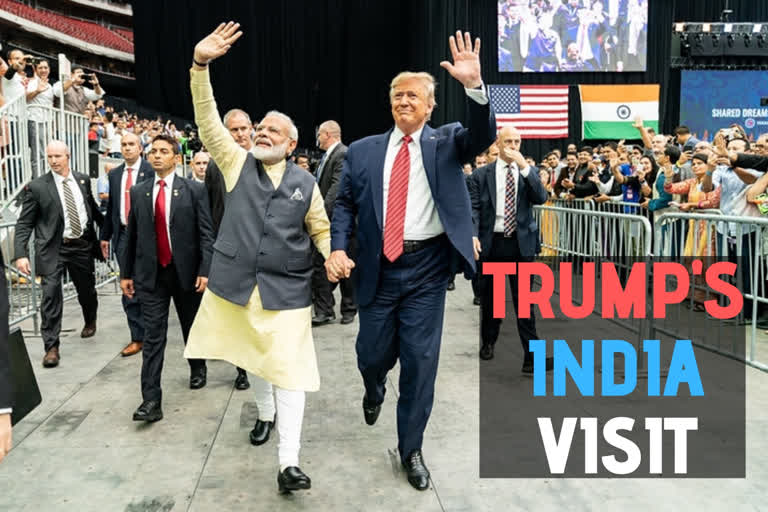New Delhi: With US President Donald Trump's upcoming visit to India, it is hoped that the year-long trade war between the two countries will see an end. Trump, while announcing his visit said, that if a common platform is reached, a trade deal will be signed.
After Trump became the President, it was clear that economic protectionism and trade issues will be driving the policies of the administration. Interestingly, India and America consider each other to be strategic partners, but on the issue of trade, both have always seemed to be at loggerheads with each other. Both the countries have differences on issues relating to Dairy, Agriculture and Technology. By signing various trade deals with China, Mexico and Japan, Trump has made it clear that he has very less faith in international trade organisations like the World Trade Organisation (WTO).
With respect to trade and technology, America is India's biggest trading partner. In 2014, trade between the two countries was at a whopping USD 182 billion. It will not be wrong to say that if trade relations between the countries are back on track, this number could reach USD 200 billion in the next few years. To realise this trading potential between the countries, a trade agreement between America and India is the need of the hour. In this context, we can learn a thing or two from China which had a pragmatic approach to the issue. Our strategic partnership with America will be strengthened only when we are able to untangle the trade tensions that plague our nations.
The other issue which will top Trump's agenda will be to devise a mechanism to counter China's growing influence in the Indian ocean and Pacific ocean. Last year, Pentagon used the term 'Indo-Pacific' instead of 'Asia-Pacific', hence, signalling the importance of India's role in maintaining peace and stability in the region.
Read:INTERVIEW: 'Partial deal unlikely, but trade does not define Indo-US ties'
The ongoing military exercise between India, America, Japan and Australia should be viewed in context to the aggressive policies of China in the region. The meeting between the foreign ministers of these four countries last year during the United Nations General Assembly, gave signals that military exercises should be seen in geopolitical context unfolding in the region.
After Trump became the President, America's position in the international community has seen a steady decline, whereas China during this time has consolidated its position in the international community, both economically and militarily. China's aggressiveness with respect to India has been evident in more than one way. China's aggressiveness in the United Nations General Assembly with respect to Kashmir was part of this policy execution. It is an open secret that China and Pakistan together are emerging as a military challenge for India. China has challenged America's dominance internationally. Thus, to safeguard its interests, India needs to strengthen its ties with America and other countries.
It is obvious that we should not be part of any anti-China camp, but it is essential to reply to China's aggression in a diplomatic manner, as China has developed artificial islands and enhanced its military might in the South China sea, which should act as an alarm bell for the rest of the world. America doesn't feel competent to counter China's aggression on its own. Hence India's role in the Indian Ocean area is considered important.
With respect to agreements between the two countries, we have seen more cooperation between the armies of the two countries in the fields of operations and communication. In the last 12 years, India has purchased defence equipment worth USD 20 billion from America, which is a clear signal of deep-rooted defence ties between the two countries.
Read:Expectations high on 'mini' trade deal during Trump's visit: India Inc
Whenever there have been summit-level talks between India and America, there has been a mention of Pakistan. President Trump has reiterated a number of times, that if both the countries agree, he is ready to mediate on the Kashmir issue. Prime Minister Modi during a press conference with Trump had made it clear that there is no scope of mediation.
On the issue of Pakistan exporting and sponsoring terrorism in India, America has repeatedly said that Pakistan needs to stop being a safe haven for terrorists. High-level cooperation exists between India and America on terrorism and it needs to be strengthened further. Trump can again request India to resume talks with Pakistan. Given the current environment, it is evident that there is no room for productive talks with Pakistan. Generally, after India visit, American Presidents have been going on a short visit to Pakistan, but, by not doing so, Trump has signalled to Pakistan that the environment there is not conducive for his visit.
